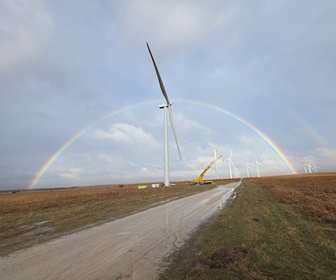MAKE’s Q3/2017 Global Wind Power Market Outlook Update presents an analysis of global and regional wind power installation forecasts through 2026. The proliferation of auction mechanisms globally has generally had a beneficial impact, driving and further accelerating cost-out measures and resulting in a significant amount of wind capacity awarded. As markets transition fully into an auction environment, however, a few adverse impacts on near term demand have occurred from the transition to new regulatory frameworks. As markets adjust to new dynamics, growth fundamentals will resume, supporting the long-term global outlook.
MAKE downgrades its global outlook in Q3 by more than 6GW, as cuts in the near-term outweigh long-term upgrades. Market responses to auction results are mixed in the near-term and contribute to the downgrade. A multi-GW cut in the outlook for China from 2017 to 2019 has an outsized impact on the near-term outlook, although it decreases China’s 10-year outlook by less than 2%. Globally, MAKE downgrades the near-term outlook for each sub-region QoQ in Q3, impacting a 1% cut in total capacity added over the 10-year period.
Market dynamics in the US are squeezing the four-year PTC bubble to bulge even more severely in 2019 and 2020. Long interconnection queues and a lack of demand-side urgency have shifted demand from 2017 and 2018 to 2019 and 2020, further inflating what will become a two-year record for new capacity in the US. Careful forward planning is necessary to avoid value chain bottlenecks and potential delays, which may disqualify a project for full-value PTCs.
Economic weakness in Brazil, coupled with a reverse auction, results in nearly a 4% downgrade over the 10-year outlook. New auctions announced for December offset some of the lost opportunity from the absence of an A-3 auction in 2017, but not until after 2020. The dynamic in Brazil clouds momentum in Argentina, where firm order commitments and rules and conditions for RenovAr Round 2 bolster the outlook. Overall, however, the outlook in Latin America is downgraded by nearly 2% QoQ.
Auction dynamics influence different near-term results in Europe, but ultimately cause a 5% downgrade QoQ in new capacity from 2017 to 2019. Over 10 years, the net difference QoQ is negligible, due to markets evolving from current auction dynamics as well as offsetting upgrades in certain markets (e.g., the UK, the Netherlands, and Norway).
The most significant change in outlook occurred in Germany. A 12% downgrade from 2017 to 2019 is caused by attrition of FIT-qualified projects and a high level of risk associated with the large share of community developers that won capacity at auction. The downgrade in Germany overwhelmed positive QoQ changes in other markets in Northern Europe, both in the onshore and offshore sectors, that nearly balance out the 10-year outlook.
Auction dynamics also impacted the outlook for Spain as the number of inexperienced developers that won capacity at auction and the large winning share of PV results in a 2.7% downgrade QoQ. Minor downgrades QoQ in France and Turkey – despite the successful 1GW YEKA auction in Turkey – contribute to a 1% downgrade in the outlook for Southern Europe.
No net change in Eastern Europe QoQ as a medium-term upgrade offsets a short-term slump. Project attrition of capacity awarded in early auctions in Russia caused some of the near-term downgrade, along with difficult development and finance conditions in Poland and Romania, respectively. The award in Russia of 1.65GW in the July auction galvanizes the market, attracting leading Western European players willing to invest in the emerging market, highlighted by Vestas’ recent announcement to establish a blade plant by mid-2019.
Post-auction dynamics in India have created an impasse between state utilities and IPPs, which results in a 4% downgrade over 10 years. State governments eager to transition from comparatively higher FIT levels locally are somewhat paralyzed from creating new demand. Not only are they pressuring IPPs to accept the low pricing awarded at the central government auction in Q1, but they await guidelines from the central government that are required before implementing state-level auctions.
Including India, the outlook for Asia Pacific excluding China is downgraded by 1.7% QoQ over the 10-year period. However, excluding India and China, the outlook is upgraded by 1.5%. Positive developments in Australia, including several large project announcements, anticipation of auctions in the states of Queensland and Victoria, and warnings of a potential generation deficit over the next 10 years by the energy market operator support expectations in the market. Upgrades in Thailand, after resolution of land disputes, and in the Philippines, add to a higher 10-year outlook than reported last quarter.









